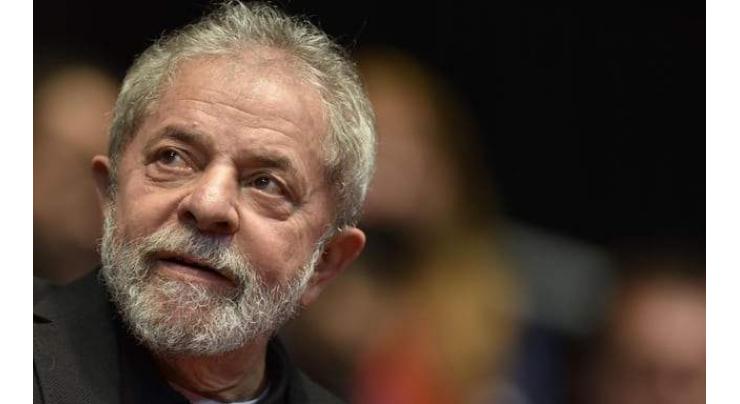
Five Key Questions For Brazil In Lula Court Showdown
Mohammad Ali (@ChaudhryMAli88) Published April 04, 2018 | 12:17 AM

Brazil's Supreme Court is to decide Wednesday whether former president Luiz Inacio Lula da Silva goes to jail in a ruling that could have a huge impact on October's presidential election. Here are five key points of what's at stake in the meeting of the 11 justices.
Bras'lia, (APP - UrduPoint / Pakistan Point News - 4th Apr, 2018 ) :Brazil's Supreme Court is to decide Wednesday whether former president Luiz Inacio Lula da Silva goes to jail in a ruling that could have a huge impact on October's presidential election.
Here are five key points of what's at stake in the meeting of the 11 justices. - What does Lula want? - Lula was sentenced to 12 years and one month prison after being convicted of accepting a seaside apartment near Sao Paulo as a bribe from a construction company seeking contracts.
A lower court appeal against the conviction failed, which under current law means that he should start serving his sentence immediately, conducting further appeals from behind bars. But Lula hopes the Supreme Court will grant him habeas corpus, allowing him to remain free while pursuing those further appeals.
- What could the court decide? - The Supreme Court is almost evenly divided on the law requiring prison after the failure of a first appeal. So it would take only one justice to switch sides for Lula to be granted his request.
If granted habeas corpus, pending further appeals, Lula would take his case to the next highest appeal court, the Supreme Tribunal of Justice. That process would likely drag on for a considerable time, during which Lula would remain at liberty.
However, if the court turns down Lula's habeas corpus request, he would face prison within days. It's also possible, but considered unlikely, that the Supreme Court will suspend Wednesday's session and reconvene another day.
- Can Lula still run for president? - Under current law, anyone convicted of a crime is barred from seeking public office. That should, in theory, bar Lula in his presidential quest, even if the Supreme Court rules that he can stay out of prison pending new appeals.
However, there is a slender chance that Lula's challenge to the rule on serving prison sentences immediately after a failed first appeal could also prompt a revisiting of the electoral law.
Lula will likely seek to string out his legal case as long as possible, hoping to find some way onto the ballot.
- What if he doesn't run? - Candidates all want to know for sure whether Lula is in or out. He scores above 30 percent in polls, which is double his nearest rivals, so his absence would dramatically shift the field.
Currently polls show the electorate divided chiefly between leftist Lula and hard right candidate Jair Bolsonaro. Lula's exit would open opportunities for other leftists currently in his shadow, or potentially for a more centrist candidate like Sao Paulo Governor Geraldo Alckmin.
There is increasing talk of Joaquim Barbosa, a former supreme court justice himself, getting into the race. Barbosa would likely benefit from Lula's exit, pulling in much of the left, while also cutting a more attractive option for centrists.
- Is Brazil's wider graft battle ending? - To those on the right, putting Lula behind bars would be the peak achievement of "operation car Wash," the mammoth probe that has uncovered systemic embezzlement and bribery in Brazil's high politics over the last four years.
Prosecutors have plenty of other big fish. Current President Michel Temer has already been charged twice with corruption and a third charge could be imminent. So far, he has only escaped trial because he is shielded by a loyal Congress.
But analysts say that prosecutors' hands will be greatly weakened if Lula's case leads to a change in the law requiring prison after the failure of initial appeals. Prosecutors rely heavily on the threat of imminent prison to pressure corrupt politicians to cut plea bargains and inform on their colleagues.
If those accused of corruption know they can remain free while their case is tied up in multiple appeals, they'd be less likely to cooperate.
Related Topics
Recent Stories

Punjab CM inaugurates Pakistan’s first Virtual Women Police Station

Dutch model Donny Roelvink embraces Islam

Experts raise concerns over introduction of 10-stick packs

Iranian president arrives in Karachi

Law Minister expresses Govt's resolve to address issue of missing persons

Rizwan’s batting order may be changed: Sources

Nawaz Sharif to visit Guangzhou exhibition in China

FM Dar not traveling to China: Foreign Office

PM takes notice of deliberate delay in tax cases

Iranian President visits Allama Iqbal’s mausoleum

Iranian President arrives in Lahore today

Currency Rate In Pakistan - Dollar, Euro, Pound, Riyal Rates On 23 April 2024
More Stories From World
-
Ukraine moves to bring military-aged men home to fight
1 hour ago -
Asia hit hardest by climate change, extreme weather: UN weather agency
1 hour ago -
Muscles and masterpieces: Louvre offers Olympic sport sessions
1 hour ago -
Migrant boat capsizes off Djibouti leaving 16 dead
1 hour ago -
UK Rwanda law sparks fear among migrants hoping to cross Channel
3 hours ago -
China issues highest-level rainstorm warning after deadly floods
3 hours ago
-
UK's Sunak announces raised defence spending, new Ukraine aid
4 hours ago -
Baby delivered from dying mother's womb in Gaza 'miracle'
4 hours ago -
Russia rejects US journalist Gershkovich's detention appeal
4 hours ago -
Prosecutors accuse Trump of 'willful' violations of gag order
5 hours ago -
French artist JR downsizes at Venice Biennale with Orient Express
6 hours ago -
Umrah & Ziarah Forum 2024: A gateway to enhance pilgrimage services in Holy land
6 hours ago